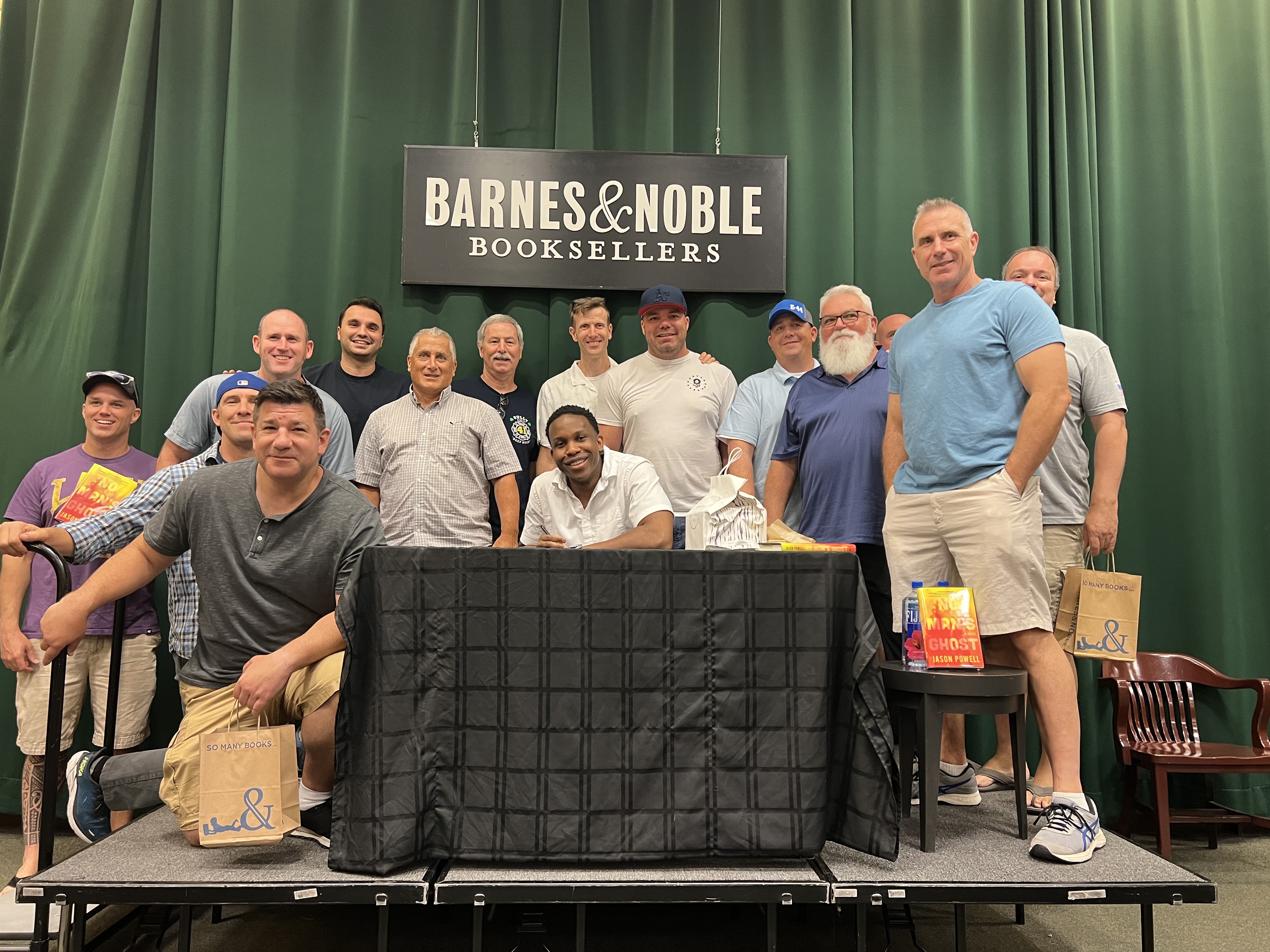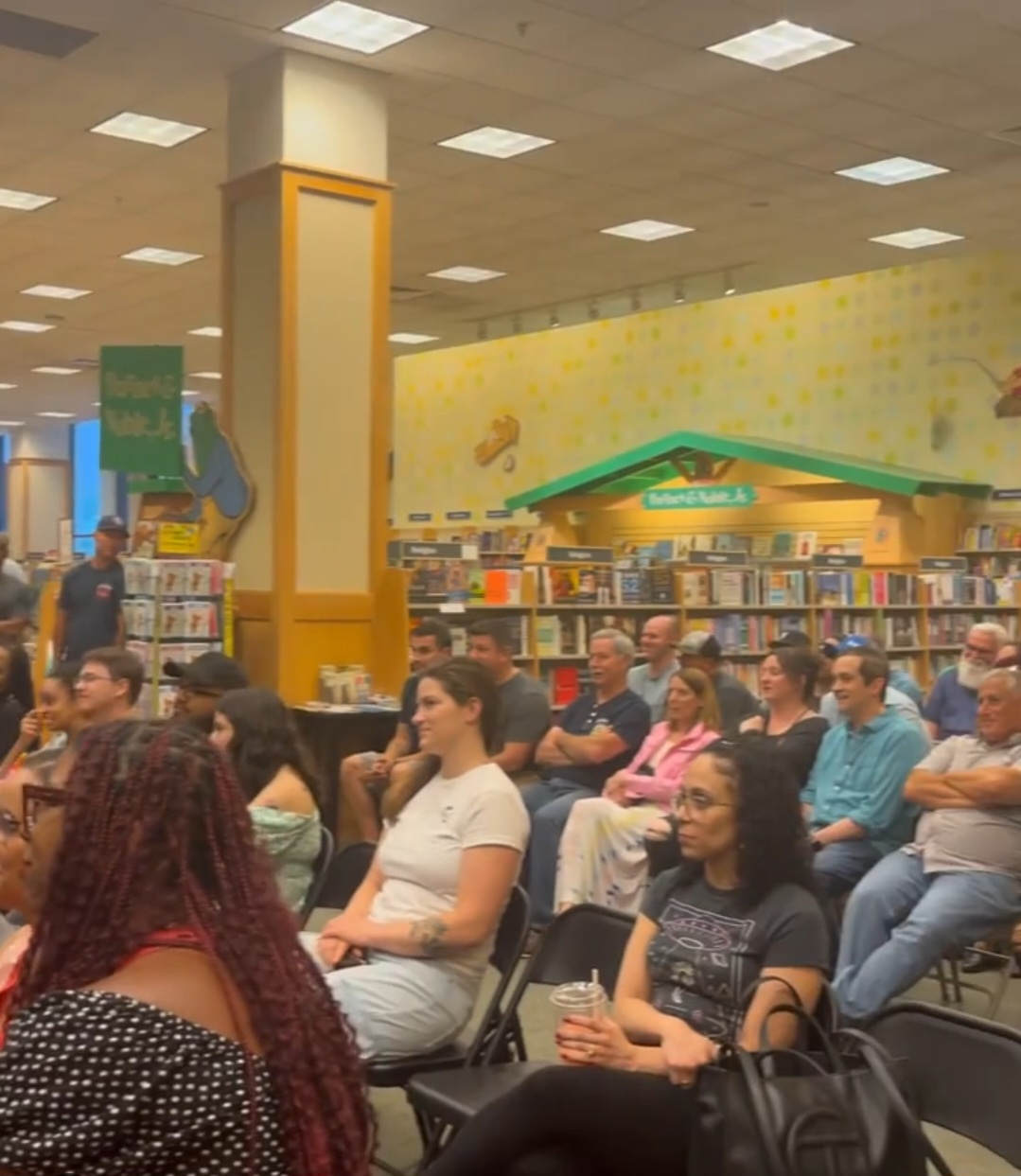Jason Powell, No Man’s Ghost
excerpt

No Man’s Ghost Publisher: Barnes & Noble Date: June 27, 2023 Length: 297 pages ISBN: 9781957957081 |
-1-
WHEN A WINDOW ON the sixth floor exploded, the crowd across the street gasped and backed away. A firetruck in front of the building had a ladder extended to the roof and the man climbing it paused at the sound of the blast, before continuing up quickly. On the ground, residents of the building rushed out of the entrance in pajamas and robes or shorts and t-shirts, some wrapped in bed sheets. They ran, bent low, hands over their heads, ash and glass and small debris falling around them. Police tape stretched from a lamppost on the corner to a green sanitation garbage pail dragged to the middle of the street, and cops waved the residents behind it to join a crowd of passersby who’d stopped to watch.
Those from the building huddled together at the front of the crowd and looked on in awe, wringing their hands or rubbing the backs of their arms. From where they stood, every visible window on the top floor was in flames. The building was only six stories high, and the heat from the fire could be felt at street level.
More firetrucks arrived. Firefighters poured from them, looked up quickly, then hurried to the building. A long hose made up of smaller ones connected together snaked its way from the side of a firetruck to the street, onto the sidewalk, then disappeared inside. More residents ran out, dodging the firefighters and hopping the hose, to join their neighbors across the street. On the top floor, black smoke began to seep from behind the fire in one of the windows; a thin, shifting cloud silhouetted against the night sky. The flames from that window flickered stubbornly, pulsed, then finally disappeared altogether. Water splashed out in spurts, raining down on the street below, and the crowd cheered.
The smoke from a second window turned black and the fire in that window went out too. A firefighter appeared in the first window, using a tool to knock shards of glass and charred wood away. The people on the street applauded at the sight of him, and the cheers grew louder. The firetruck in front of the building had another man climbing the ladder now, obscured occasionally by the new smoke coming from the windows. Those in the crowd with children crouched to the kids’ height and pointed him out.
Then two paramedics pulling a stretcher ran past the crowd to the building. From the entrance, two firefighters, one walking backward, came out carrying someone underneath the arms and knees. Either by chance or discretion, it was difficult to see the person being carried; but the firefighters weren’t struggling, which gave some in the crowd the impression that whoever it was didn’t weigh much. Someone small.
The two paramedics paired up with the two firefighters and got whoever it was onto the stretcher. One of the medics started pushing on the person’s chest while the other held an oxygen mask over their face, and together they rolled the stretcher to the back of an open ambulance. The two firefighters went back inside.
At the front of the crowd, furtive looks were exchanged and for a long moment, no one spoke. Then some obvious questions were asked, and an unofficial and unorganized census began. Next door neighbors looked for each other and made sure kids and elderly family members were out of the building and accounted for. Friends looked for friends who didn’t live on the same floor but lived in the building. Nearly everyone looked for the young girl with autism who lived on the fifth floor. She lived with her single mom, and everyone was relieved to find them both near the back of the crowd, on a bench.
Then the search narrowed. Each floor above the first had four apartments and everyone seemed generally confident that those who lived below the top floor had made it out safely. But what about the four families on six?
Two were accounted for right away. One family was away at Jersey Shore for the long
Fourth of July weekend. The man who lived next door knew that because he’d been asked to receive a package for them. He and his girlfriend were in the crowd with everyone else, and though they were obviously upset about the fire, they were physically okay. Firefighters had practically knocked his door off the hinges, he said, and rushed them out of the apartment. He didn’t know the status of his neighbors in the other two apartments-a couple in one, a widowed old lady in the other-but from what he was looking at from the street, he feared that if they weren’t out by now, then they weren’t okay. He said so, and those who heard him agreed.
The crowd looked back to the sixth floor. Flames still flickered in a few of the windows. Men could be seen in others, on their knees, or duckwalking with flashlights on their helmets or coats, one behind the other, aiming a thick hose at a corner unseen from the street. Then a rumbling sound like thunder, a crash, and they were gone.
A cloud of dust and smoke, flecked with glowing embers, rolled ferociously from the top floor like a tide. It spread out above the street and again the crowd gasped and retreated.
Across from them, firefighters outside the building shouted to each other and into their radios. One of the men from the roof was back on the ladder, holding on to the rungs, unmoving. Two more men climbed to the top of the truck and called out to him, but if he heard them, he didn’t show it.
At the entrance to the building, firefighters streamed out, apparently uninjured, looking up once they cleared the threshold. They peeled oxygen masks off their faces and joined their coworkers, worry and sweat on their faces.
The man on the ladder started down then, moving slowly, but doing it on his own. The two at the foot of the ladder waited for him, but stared at the windows on the top floor, where muffled shouts could be heard behind the cloud.
More firefighters exited the building, some with soot on their coats and helmets. Paramedics and emergency medical technicians ran to the entrance to meet them, but the firefighters waved them away and joined the others in the street, looking up.
Then a distant alarm started from the top floor. No one in the crowd across the street had ever heard the sound before, but it was eerily high-pitched, and the look of unease on the faces of the firefighters made those who saw them worry. When the alarm started, a fireman in the street said something on a radio clipped to his chest, and five other firefighters near the entrance grabbed a sled full of tools and ran inside the building. The dust cloud was dissipating, and as it did, the sound of the alarm grew clearer.
Then another one started up there. Out of sync with the first, but same eerie high-pitched tone, same anxiety from the firefighters on the street. Then a third.
The cloud had cleared enough that the windows were again visible. Everyone in the street, both in front of and behind the police tape, looked up at them. Fire burned somewhere inside, behind a few of the windows. In the others, darkness. No movement. Just a creepy chorus of alarms.
The fireman in front of the building who’d spoken before spoke again into his radio, and others started waiving to another group of paramedics, who pushed a stretcher covered in bags through the crowds. At some point a second hose line had been stretched into the building, and the medics lifted the wheels of the stretcher over both lines on their way to the entrance.
Though the sun had long ago set, the temperature was still high. New York City was on its fourth day of a heatwave. Some of the fire from the building had been washed away, but much remained and could still be felt below. Despite those things, many in the crowd looked at the worry on the faces of the firefighters or up at the windows, listened to the alarms in the darkness, and shivered.
A woman from the fifth floor, the autistic girl’s mother, chewed her bottom lip and stroked her daughter’s hair. She turned to the man from the sixth floor and asked, “How did this start? Do you know?”
The man shrugged. “Only God knows,” he said. But he was wrong.
TWO STREETS AWAY, OUT of the glow of the lights from the emergency vehicles, the man who started the fire leaned on a gate and watched the growing crowd. He was wearing a bright shirt and was afraid that if he got any closer, he’d be spotted.
An ambulance sped away from the building and passed him, lights flashing, sirens wailing. There was only one person in the front, which meant there was someone in the back with a patient. The man turned his head and watched the ambulance until it turned a corner and was lost to sight.
And he laughed.
Copyright © 2023 by Jason Powell



